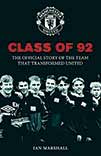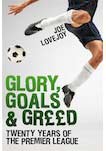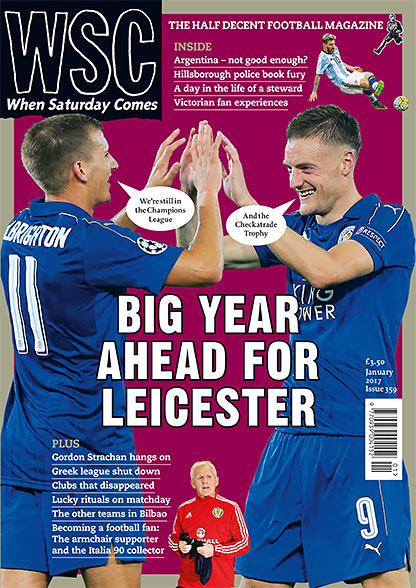Search: 'Gordon Taylor'
Stories
 The official story of the team that transformed United
The official story of the team that transformed United
by Ian Marshall
Simon & Schuster £18.99
Reviewed by Joyce Woolridge
From WSC 307 September 2012
“He’s only tiny; he’s got ginger hair – you’ll probably have a bit of a laugh. But he can’t half play.” Thus Brian Kidd prepared Eric Harrison, Manchester United’s celebrated youth team coach, for the less than auspicious arrival of the young Paul Scholes at the Cliff training ground. Scholes’s success and longevity is perhaps the most remarkable of all the luminaries of the 1992 FA Youth Cup-winning side, which also included Giggs, Beckham, Neville, Butt… and Robbie Savage.
Scholes’s hair colour proved no great problem, but he was tiny, suffering from bronchitis and Osgood Schlatter’s disease which gave him bad knees, and had no real pace and strength. Despite his abundant and obvious skills, just one of these disadvantages should have been enough to ensure that he joined the ranks of the 500 or so boys joining Premier League and Football League clubs at the age of 16 who, according to the PFA’s Gordon Taylor, are out of the game by the time they are 21.
That he was taken on and made it into the first team is testament to the patience and foresight of Harrison, Kidd, Nobby Stiles and Alex Ferguson, though even they would probably have rejected Lionel Messi for being too small.
Few things are as intoxicating for a football fan than the promise of youth. Last season, stories of the emergence of another brood of Fergie’s Fledglings generated the traditional, heady expectations of more “golden apples” among United’s support, providing a welcome distraction from the head-splitting absurdities of Glazernomics.
Ian Marshall’s account duly begins at Moss Lane, Altrincham this January, wondering, with appropriate caution, whether the current crop can follow in the footsteps of their illustrious predecessors – the Busby Babes and the “Class of 92”. Subsequent interesting chapters detail how Stanley Rous inaugurated the Youth Cup in 1952 and how United’s youth “system” pre-dated the war and Busby, who became youth’s most high-profile promoter.
An official United book for sale in the club megastore is hardly going to be shot through with radical revisionism and searing comment, but nevertheless Marshall handles the material skilfully, interweaving the fortunes of the 17 players who made up the squad with a match-by-match account of the 1992 campaign.
Only four of these players dropped out of professional football without making a senior appearance, a remarkable statistic given the high wastage rate which persists in England and demonstrated by an instructive comparison with Crystal Palace, United’s opponents in the final. The ones that got away are inevitably more intriguing, none more so than “local hero” and crowd favourite, Salfordian George Switzer, whose name has become a pub quiz staple.
Concluding chapters take those who survived through to the present, whether to the Treble, global superstardom, down the divisions, into coaching and management or career-ending injuries, revealing a little of the darker side and the many scandalous cruelties of youth football in this country lurking beneath every glittering tale of triumph.
 Cameron Carter analyses the different reactions to football’s many controversies
Cameron Carter analyses the different reactions to football’s many controversies
Just as there must statistically be teatime programmes on the BBC that do not feature Alex Jones or John Barrowman, so we must assume that there are gay footballers out there somewhere in the universe. In Britain’s Gay Footballers (BBC3, January 30), Amal Fashanu, niece of Justin, daughter of John, quested for a gay man among the 4,000 professional players registered in the UK.
 Positive action is required to back up anti-racism initiatives
Positive action is required to back up anti-racism initiatives
If it is possible to gauge the extent of a problem by the number of organisations that exist to counter it, then racial prejudice is still a pressing issue in British football. Scarcely a week goes by without news of an anti-racism initiative somewhere. There are regular conferences on the subject, annual action weeks, supportive visits to schools by famous players, T-shirts, stickers, newsletters and banners unveiled at grounds. Every season spectators are evicted for racist abuse and barred for life by their clubs. Although, as most people who go to games on a regular basis will be aware, some stewards and police forces are more diligent than others in rooting out abusers.
 Twenty years of the Premier League
Twenty years of the Premier League
by Joe Lovejoy
Mainstream, £11.99
Reviewed by Joyce Woolridge
From WSC 304 June 2012
Joe Lovejoy seems to have set out to write an analysis of the circumstances surrounding the Premier League’s formation and of some of its biggest issues since then, notably foreign players, foreign managers, foreign owners, bungs and grasping agents. The decision to do this chiefly through the medium of long, undigested quotations from interviews with some of the main protagonists means that much of it reads more tediously than it should.
Slotted in between the often wearisome accounts of the machinations of Rick Parry et al are chapters that cast a cursory and abbreviated eye over some of the events on the pitch. “The Big Kick-Off” chapter compiles team lists of the original 22 clubs with a brief, phoned-in intro. This is not the only section that appears to be written almost in note form, but it is one of the more engaging, if you can put faces to the names. Ditto the hasty, often obvious assortment that is “My Top Twenty Matches” (seven of which feature Manchester United being thumped or throw- ing away leads). Spurs’ 2008 comeback 4-4 draw with Arsenal ends with the mystifying statement: “The rest is Lilywhite history.”
“Managers Who Have Won the Premier League” never strays from the perfunctory, as Lovejoy divulges that Alex Ferguson has “more silverware than H Samuel”, José Mourinho is a “Portuguese charmer” and “Monsieur Wenger polarises opinion”. Rather than reading “Twenty Headline Makers”, why not try to guess which major incidents make the cut. You will not go far wrong if you stick with Manchester United, though John Terry’s shagging is a surprise number one. Eric Cantona’s kung-fu assault is unaccountably missing.
If the interviews with players and Premier League worthies that make up the other chapters are also intended to leaven the pudding, you would have thought Alan (“The Geordie Legend”) Shearer should be last on the list. Though he does let slip that “We had a smashing team at Blackburn and we won the league”. “Journeyman goalkeeper” Kevin Poole is almost equally unenlightening, as are Niall Quinn, Stan Collymore, Ryan Giggs and Teddy Sheringham.
Sky Andrew, the agent, and Gordon Taylor offer some thought-provoking comments and the concluding chapters, where the main theme returns, have their moments despite appearing curiously rushed. Most interesting are the reflections on the Financial Fair Play rules and whether UEFA will be able and willing to enforce them. Even the author’s final conclusions about whether the Premier League has met its original objectives (“I don’t think so”) are terse.
Perhaps some space could have been freed up by trimming Gérard Houllier’s rambling foreword. The book would have been improved by some coverage of the events that disrupted the “predictability” of the Premier League, which is lamented throughout, such as Norwich and Villa’s title challenges. Although the preface claims the book is “the story of the Premier League’s first 20 years”, this odd mish-mash is anything but.
